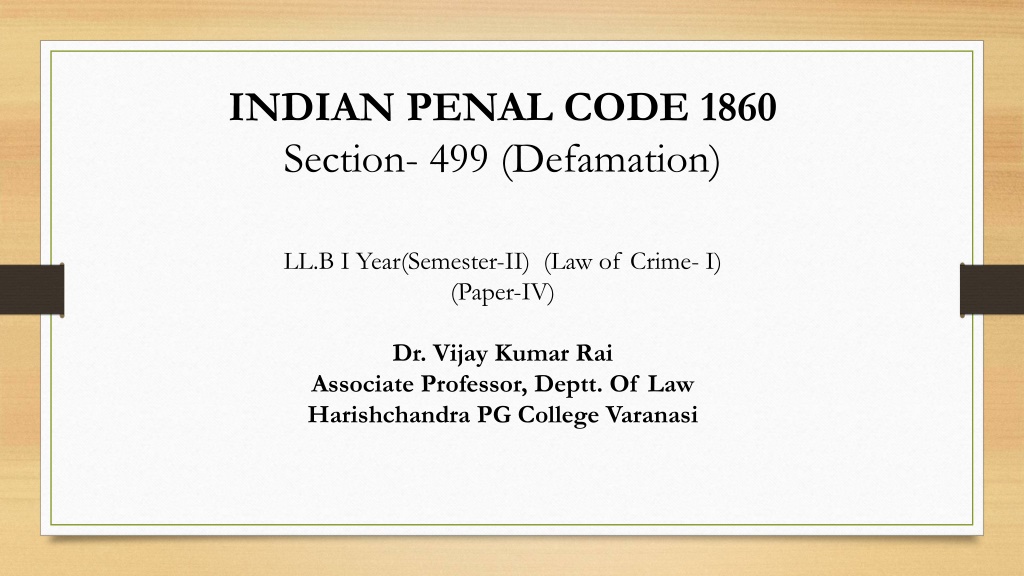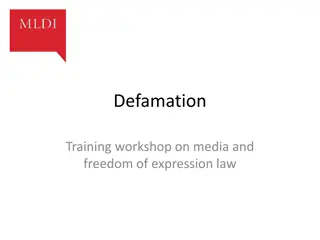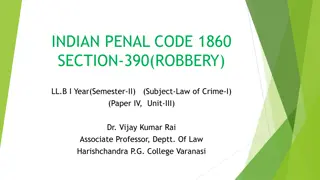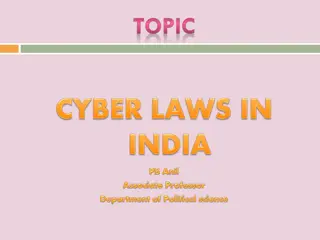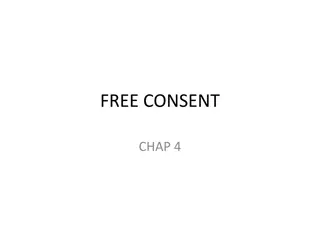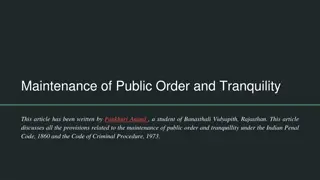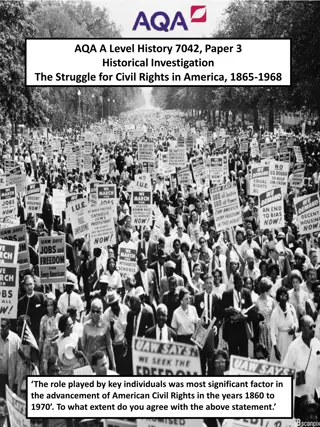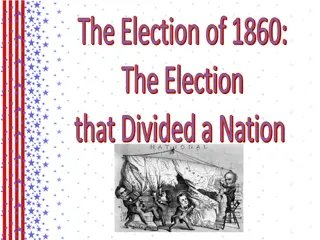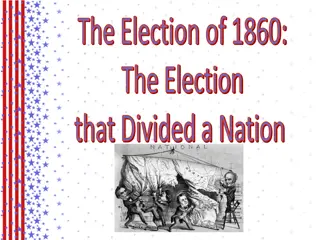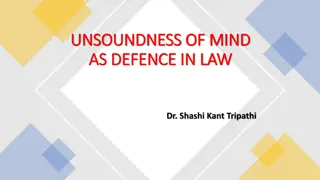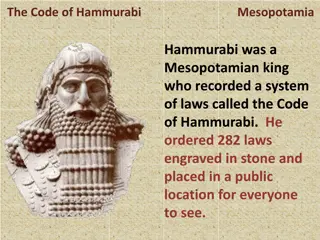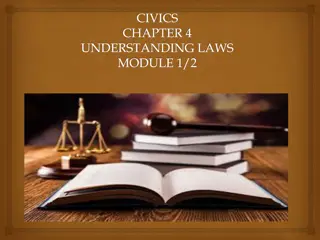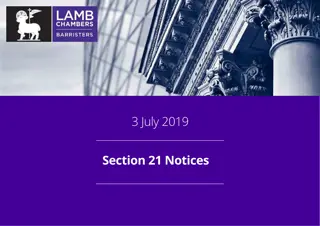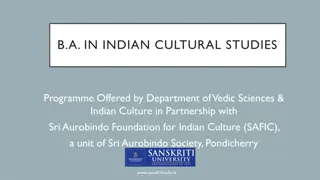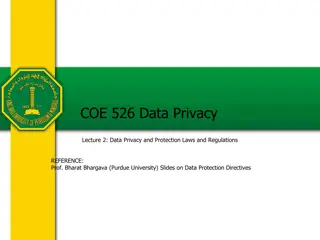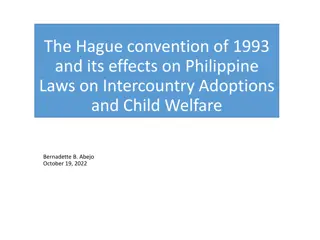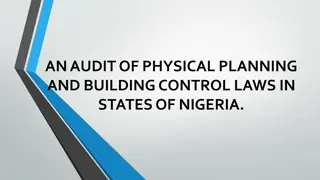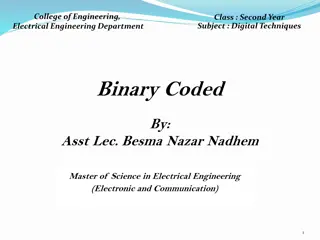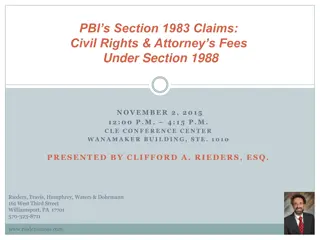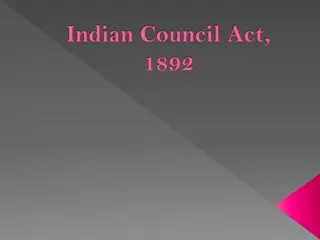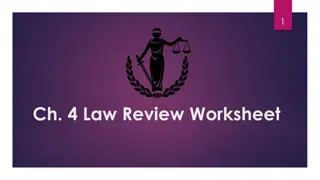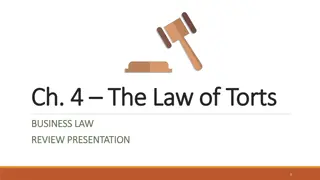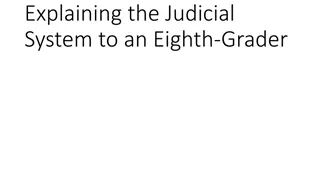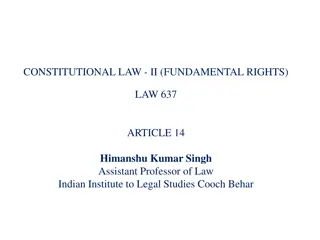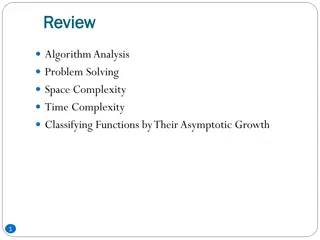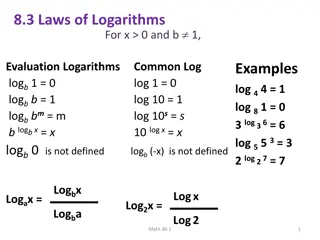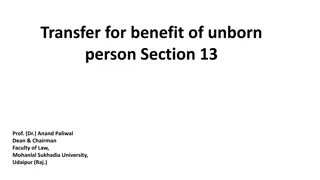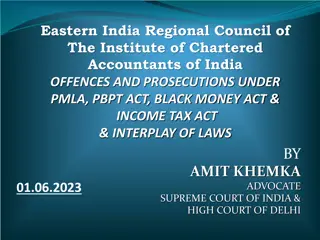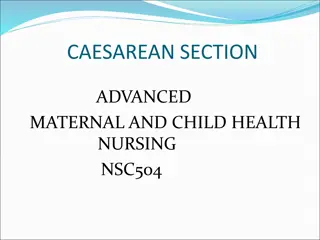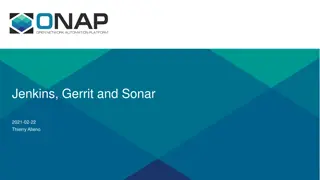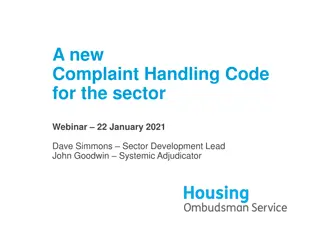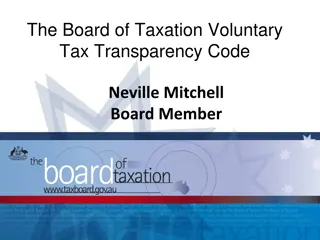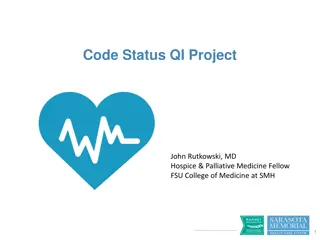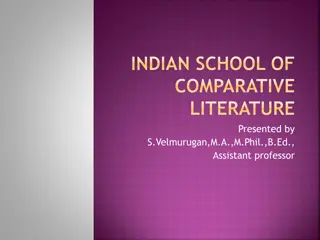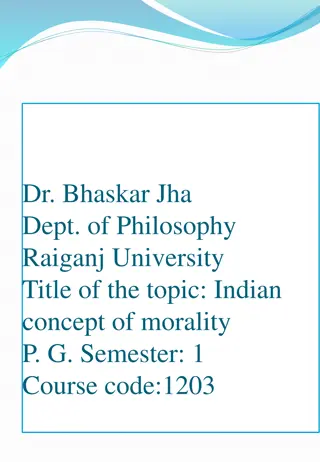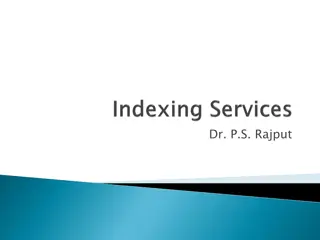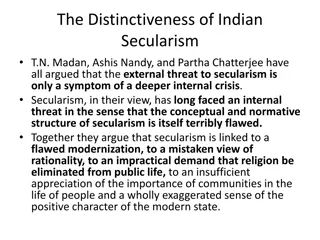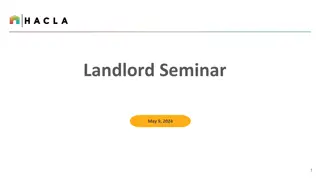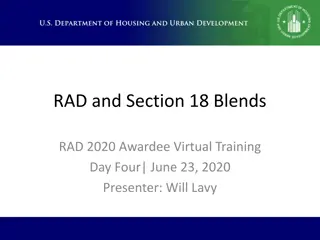Understanding Defamation Laws in Indian Penal Code 1860 Section 499
Indian Penal Code Section 499 defines defamation as making or publishing any imputation concerning a person intending harm or knowing it will harm their reputation. The section includes explanations regarding imputations towards deceased individuals, companies, and ironic expressions. To constitute defamation, the imputation must lower the moral, intellectual character, caste, calling, or credit of the person in the eyes of others. Communication of defamatory matters through various mediums and cases related to defamation are also discussed.
Download Presentation

Please find below an Image/Link to download the presentation.
The content on the website is provided AS IS for your information and personal use only. It may not be sold, licensed, or shared on other websites without obtaining consent from the author. Download presentation by click this link. If you encounter any issues during the download, it is possible that the publisher has removed the file from their server.
E N D
Presentation Transcript
INDIAN PENAL CODE 1860 Section- 499 (Defamation) LL.B I Year(Semester-II) (Law of Crime- I) (Paper-IV) Dr. Vijay Kumar Rai Associate Professor, Deptt. Of Law Harishchandra PG College Varanasi
Sec. 499- Defamation.Whoever, by words either spoken or intended to be read, or by signs or by visible representations, makes or publishes any imputation concerning any person intending to harm, or knowing or having reason to believe that such imputation will harm, the reputation of such person, is said, except in the cases hereinafter expected, to defame that person. Ingredients of Defamation:- (1) Making or publishing any imputation. (2) Imputation must have been made by words, either spoken or intended to be read, or by sign or by visual representation. (3) Imputation must have been made with the intention of harming or with knowledge.
The Four Explanations attached to the Section:- Explanation 1. It may amount to defamation to impute anything to a deceased person, if the imputation would harm the reputation of that person if living, and is intended to be hurtful to the feelings of his family or other near relatives. Explanation 2. It may amount to defamation to make an imputation concerning a company or an association or collection of persons as such. Explanation 3. An imputation in the form of an alternative or expressed ironically, may amount to defamation.
Explanation 4.No imputation is said to harm a persons reputation, unless that imputation directly or indirectly, in the estimation of others, lowers the moral or intellectual character of that person, or lowers the character of that person in respect of his caste or of his calling, or lowers the credit of that person, or causes it to be believed that the body of that person is in a loathsome state, or in a state generally considered as disgraceful. 1) Making or Publishing any Imputation- -> Communication by one person to another is the crux of publication. -> Publication of a defamatory matter can be made by a post card, telegram, printed papers or leaflets, newspaper. -> An innuendo can be pressed into service to show that the defamatory matter pertained to the complainant . Important Cases- Amar Singh v. Badalia (1965) 2 Cri LJ 693 Manmohan Kalia v. Yash AIR 1984 SC 1161 Asha Parekh v. State of Bihar 1977 Cri LJ 21 (Pat)
2) By words, either spoken or intended to be read, or by sign or by visual representation- -> The expression includes any sign or any possible form of defamation that human intelligence can devise. -> The defamation embraces both the written defamation (libel) and the spoken defamation (slander). Important Cases- Parvathi v. Mannar, (1884) 8 Mad 175 Chellappan Pillai v. Karanjia 1962 2 Cri LJ 42 3) With the intention of harming or with knowledge- -> Reputation is what others believe about the complainant. -> Malice or ill will against the person defamed is not a necessary element in defamation. Important Cases- Veeda Menezes v. Yusuf Khan Haji Ibrahim Khan, AIR 1966 SC 1773 Verghese M.C. v. Ponnam T.J., (1969) 1 SCC 37
The Ten Exceptions attached to the Section:- Exception 1. Imputation of truth which public good requires to be made or published. It is not defamation to impute anything which is true concerning any person, if it be for the public good that the imputation should be made or published. Whether or not it is for the public good is a question of fact. Exception 2. Public conduct of public servants. It is not defamation to express in a good faith any opinion whatever respecting the conduct of a public servant in the discharge of his public functions, or respecting his character, so far as his character appears in that conduct, and no further.
Exception 3.Conduct of any person touching any public question.It is not defamation to express in good faith any opinion whatever respecting the conduct of any person touching any public question, and respecting his character, so far as his character appears in that conduct, and no further. Exception 4. Publication of reports of proceedings of Courts. It is not defamation to publish substantially true report of the proceedings of a Court of Justice, or of the result of any such proceedings. Explanation. A Justice of the Peace or other officer holding an inquiry in open Court preliminary to a trial in a Court of Justice, is a Court within the meaning of the above section.
Exception 5.Merits of case decided in Court or conduct of witnesses and others concerned. It is not defamation to express in good faith any opinion whatever respecting the merits of any case, civil or criminal, which has been decided by a Court of Justice, or respecting the conduct of any person as a party, witness or agent, in any such case, or respecting the character of such person, as far as his character appears in that conduct, and no further. Exception 6. Merits of public performance. It is not defamation to express in good faith any opinion respecting the merits of any performance which its author has submitted to the judgment of the public, or respecting the character of the author so far as his character appears in such performance, and no further. Explanation. A performance may be substituted to the judgment of the public expressly or by acts on the part of the author which imply such submission to the judgment of the public.
Exception 7.Censure passed in good faith by person having lawful authority over another. It is not defamation in a person having over another any authority, either conferred by law or arising out of a lawful contract made with that other, to pass in good faith any censure on the conduct of that other in matters to which such lawful authority relates. Exception 8. Accusation preferred in good faith to authorized person. It is not defamation to prefer in good faith an accusation against any person to any of those who have lawful authority over that person with respect to the subject-matter of accusation. Exception 9. Imputation made in good faith by person for protection of his or other s interests. It is not defamation to make an imputation on the character of another provided that the imputation be made in good faith for the protection of the interests of the person making it, or of any other person, or for the public good.
Exception 10.Caution intended for good of person to whom conveyed or for public good. It is not defamation to convey a caution, in good faith, to one person against another, provided that such caution be intended for the good of the person to whom it is conveyed, or of some person in whom that person is interested, or for the public good. Punishment for the offence under this Sec. is Imprisonment for two years or fine or both. (Sec. 500) The offence under Sec. 499 is non-cognizable, bailable, compoundable with permission of the court.
